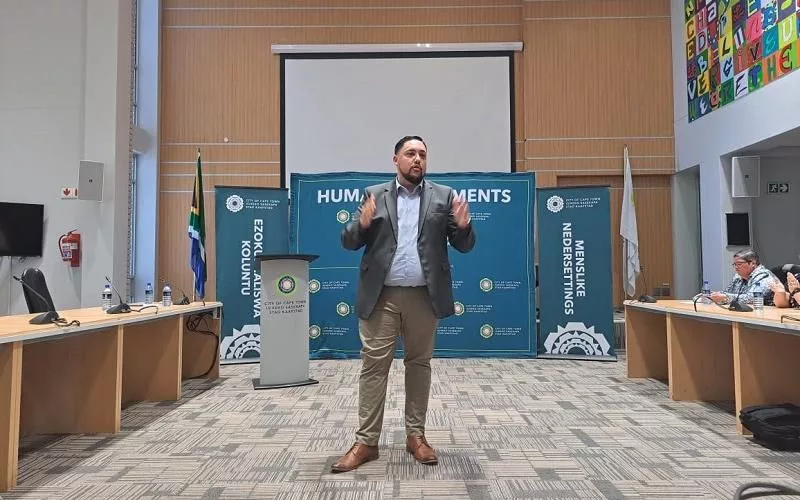Cape Town’s Mayor Geordin Hill-Lewis supports Unite Behind’s High Court application to encourage the Passenger Rail Agency of South Africa (Prasa) and the National Government to finalize a Service Level Agreement (SLA) for passenger rail standards and improvement targets. This legal action could set a precedent for future cooperation between local and national governments on public transportation matters. Collaborative planning with the national government is essential for the transfer of control of passenger rail services to Cape Town, and developing a binding SLA would ensure higher standards of service for the city’s residents.
What is Cape Town’s pursuit of a binding passenger rail service level agreement?
Cape Town is pursuing a Service Level Agreement (SLA) with Passenger Rail Agency of South Africa (Prasa) and the National Government to establish passenger rail standards and improvement targets. Cape Town Mayor Geordin Hill-Lewis supports the High Court application brought by Unite Behind to encourage finalization of the SLA to ensure enhanced services for residents. The litigation could set a precedent for future cooperation between local and national governments on public transportation matters.
Cape Town Mayor Supports Legal Action for Rail Service Agreement
Cape Town Mayor Geordin Hill-Lewis has voiced his support for the High Court application brought by Unite Behind, which encourages the Passenger Rail Agency of South Africa (Prasa) and the National Government to finalize a Service Level Agreement (SLA) with the city. This agreement would establish passenger rail standards and improvement targets, ensuring enhanced services for Cape Town’s residents.
Prasa has recently shifted its position and resumed talks with Cape Town after initially refusing to sign an SLA concerning the quality and level of passenger rail services. Hill-Lewis explained that Prasa still has the authority to finalize and sign an SLA without requiring a court order. In fact, Cape Town has already submitted a comprehensive draft SLA to Prasa for consideration.
If the litigation moves forward, the mayor is eager to address any outstanding concerns Prasa may have in finalizing an SLA. He is looking forward to examining the court documents, as the primary aim is to delegate passenger rail control to Cape Town as swiftly as possible.
Importance of Joint Planning and a Binding Agreement
For this transfer of control to happen, collaborative planning with the national government is essential. Regrettably, Cape Town is currently experiencing a lack of engagement from the national government, including a non-reply from President Ramaphosa to the city’s request for a joint devolution working committee. This forced the city to contemplate initiating an intergovernmental dispute.
A joint working committee is a critical step towards Cape Town’s ultimate objective of gaining control of passenger rail services. In the meantime, it is vital for Prasa’s service delivery to be quantifiable, with mutually agreed improvement targets. Service level planning is a legal requirement under the National Land Transport Act; however, Prasa has only ever agreed to enter into Memorandums of Understanding (MOUs). One such MOU was signed with Cape Town in 2015, but it does not provide the same binding accountability that an SLA would.
Mayor Hill-Lewis’ backing of Unite Behind’s efforts to demand a legally binding SLA reflects his dedication to offering quality public transportation to Cape Town’s citizens. Developing such an agreement is a crucial step towards enhancing the city’s passenger rail services and ensuring national organizations are held responsible for their performance.
Potential Impact of Court Intervention on Public Transportation
The continuing talks between Cape Town and Prasa illustrate the city’s commitment to improving public transportation options for its inhabitants. With the possibility of court intervention, both parties have the chance to settle their differences and collaborate on a shared objective of providing outstanding rail services within the city. Additionally, this legal action could set a precedent for future cooperation between local and national governments concerning public transportation matters.
As the situation progresses, Cape Town’s commitment to making concrete improvements in its public transportation sector becomes increasingly apparent. By advocating for an SLA with Prasa, the city aims to gain more control over its passenger rail system and guarantee higher standards of service for its residents. This effort will, in turn, contribute to the city’s overall expansion and development, offering a more effective and dependable transportation alternative for its population.
While the litigation’s outcome is uncertain, Mayor Hill-Lewis’ enthusiasm for court intervention underscores his determination to take necessary steps for Cape Town’s advantage. His proactive approach to enhancing passenger rail service demonstrates his devotion to the city’s advancement and the welfare of its residents.
In conclusion, the potential court intervention in Cape Town’s passenger rail service level agreement highlights the significance of collaboration between local and national governments. As the city and Prasa navigate this legal process, their efforts to establish a binding SLA emphasize the importance of transparent, quantifiable service standards and improvement targets. The result of these ongoing negotiations will undoubtedly play a crucial role in shaping the future of passenger rail services in Cape Town and setting an example for other municipalities globally.
What is the purpose of pursuing a Service Level Agreement for passenger rail services in Cape Town?
The purpose of pursuing a Service Level Agreement (SLA) with Passenger Rail Agency of South Africa (Prasa) and the National Government is to establish passenger rail standards and improvement targets to ensure higher standards of service for Cape Town’s residents.
Why is Cape Town’s Mayor supporting legal action for a Rail Service Agreement?
Cape Town’s Mayor Geordin Hill-Lewis is supporting the High Court application brought by Unite Behind to encourage Prasa and the National Government to finalize a Service Level Agreement (SLA) with the city to ensure enhanced services for residents.
What is required for the transfer of control of passenger rail services to Cape Town?
Collaborative planning with the national government is essential for the transfer of control of passenger rail services to Cape Town.
What is the significance of a binding Service Level Agreement compared to a Memorandum of Understanding?
A binding Service Level Agreement provides more accountability and quantifiable service standards and improvement targets than a Memorandum of Understanding.
What is the potential impact of court intervention on public transportation in Cape Town?
The potential court intervention in Cape Town’s passenger rail service level agreement could set a precedent for future cooperation between local and national governments concerning public transportation matters and could lead to improved rail services for Cape Town’s residents.
Has Prasa agreed to sign a Service Level Agreement with Cape Town?
Prasa initially refused to sign a Service Level Agreement with Cape Town; however, they have since resumed talks, and Cape Town has submitted a comprehensive draft for consideration.
Is there a lack of engagement from the national government concerning public transportation matters in Cape Town?
Cape Town is currently experiencing a lack of engagement from the national government concerning public transportation matters, including a non-reply from President Ramaphosa to the city’s request for a joint devolution working committee.
What is Mayor Hill-Lewis’ stance on court intervention for a Rail Service Agreement?
Mayor Hill-Lewis is enthusiastic about court intervention and is eager to address any outstanding concerns Prasa may have in finalizing a Service Level Agreement. He is committed to enhancing passenger rail service to ensure the welfare of Cape Town’s residents.








